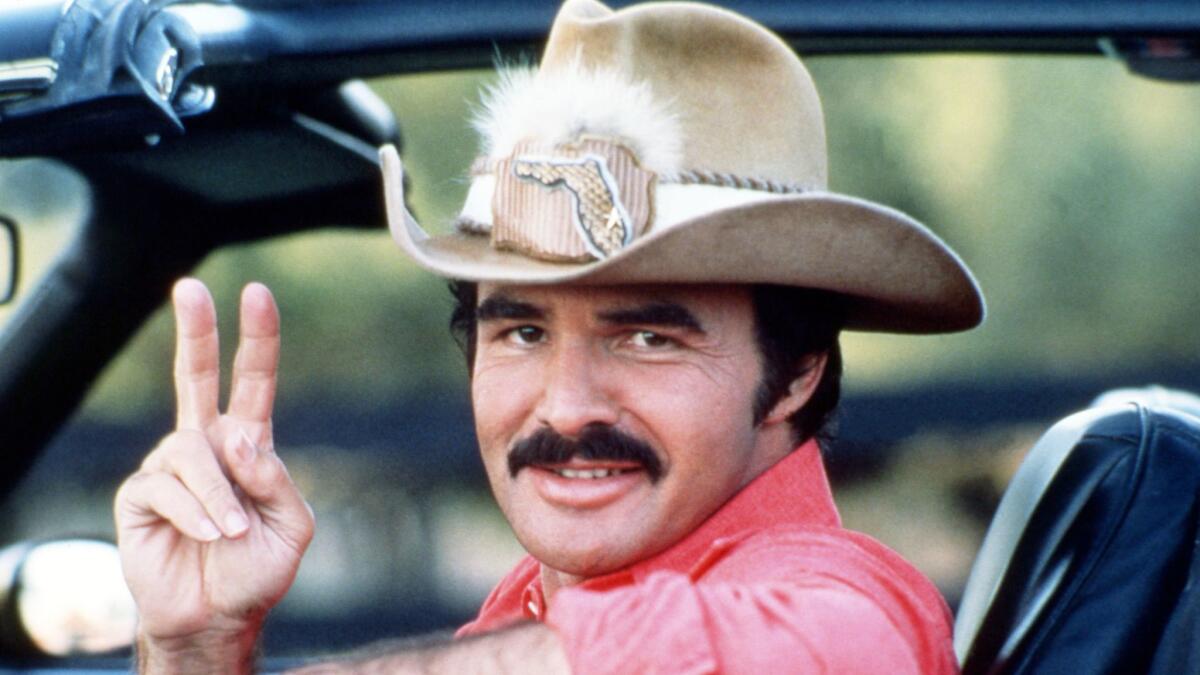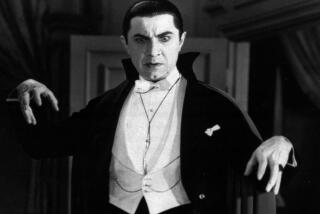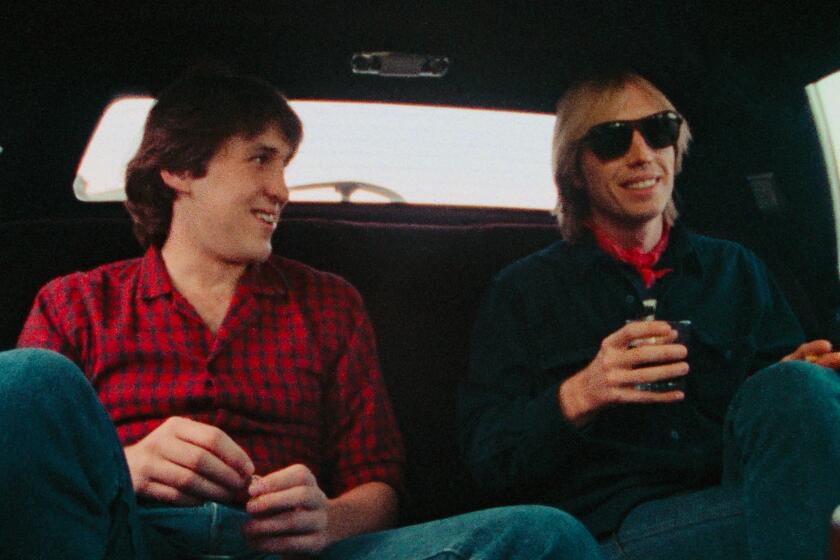The high jinks and despair of the Southern man from ‘Smokey and the Bandit’ to the new ‘Logan Lucky’

The country was two years out of Vietnam and still bruised by Watergate when a wise guy in a Pontiac Trans Am roared through a movie that celebrated and poked fun at Southern culture with the affable charm of a moonshiner whispering tall tales in a roadhouse on a humid night.
“Smokey and the Bandit” is 40 years old, a raucous good ol’ boy tale that made Burt Reynolds a brand and left the screen crackling with country music, CB radios, car chases and the irascible and out-foxed Sheriff Buford T. Justice, played with gun-toting aplomb by Jackie Gleason. The movie is the South winking at itself, playing stereotypes for humor and laughing along at caricatures. It was a blockbuster.
It arrived as America was drifting from the turbulence of the ’60s and into the shaken aftermath of a misbegotten war in Southeast Asia and the disgrace of President Nixon’s resignation. “Smokey” was a salve, a lightweight rush of steel, beer and corny one-liners that epitomized an escapist (some would argue vacuous) pop culture as it raced through a land that flew the Rebel flag and strummed tunes of Dixie.
That folksy if simplistic notion drove other films and TV shows, including “The Dukes of Hazzard,” but Hollywood’s light-heartedness often belied the South’s deeper conflicts and scars over racism and civil rights in an often brutal history. That vexed legacy has been roused in the recent backlash over HBO’s “Confederate,” a proposed alternative history series that reimagines the South seceded from the North during the Civil War and continues to practice slavery today.
The cultural battleground the South has become also complicated portrayals of white working-class men who felt isolated and disenfranchised at a time of shifting demographics and technologically driven job markets. The country, many of them felt, was slipping beyond them, misunderstanding their pride and insecurities while turning them into punchlines and cautionary tales. Reynolds, who grew up in Florida, said he was long disturbed by films that mischaracterized the South.
“Lots of movies ridiculed Southerners, and I resented them.”
— Burt Reynolds
“Lots of movies ridiculed Southerners, and I resented them,” Reynolds, 81, wrote in his 2015 memoir “But Enough About Me.” “I wanted to play a Southern hero, a guy who was proud of being from the South. … Most of those folks are middle-of-the-road, not left or right. They believe in God, they work hard, and they love their country. They’re the people I grew up with, and I like them.”
He continued: “But Billy Bob Thornton had the last word. ‘You know,’ he said, ‘down South, we consider “Smokey and the Bandit” a documentary.’”
UPHEAVAL IN THE U.S. HITS HARD
The South and the white rural and working-class ethos that “Smokey” symbolized turned anxious and resentful over the decades, propelling the rise of Donald Trump, who in 1977, the year Jimmy Carter was sworn in as president, was trading in New York real estate and marrying first wife, Ivana. As the nation crossed into a new century, it was torn by wars, terrorism, rancorous politics, redistributed wealth and economic upheavals that hit hard across the Rust Belt and the South.
President Trump is now on his third wife, and a new variation of “Smokey” as realized by director Steven Soderbergh snakes along with sly glee in “Logan Lucky,” the saga of Jimmy Logan (Channing Tatum), an out-of-work West Virginia heavy equipment operator who plans a robbery with his one-armed Iraq vet brother (Adam Driver), a strange-talking convict (Daniel Craig) and a collection of beer-tipping misfits.
The movie, which opens Aug. 18, nods to the nation’s class wars and other travails, including the healthcare debate (Jimmy Logan has a preexisting medical condition) and a decline in coal mining jobs from 242,000 in 1980 to about 50,000 today. The film portrays the South as a stoic if wacky land of beauticians, county fairs, little girl beauty pageants, trailers, McMansions, high-school glory day heroes and men who wear ball caps, camo-pants and genuflect at the altar of NASCAR.
Such emblems — like the hoodie or the hijab — can draw convenient distinctions in an America restive over race and culture. They are shorthand for the complexity of our differences and meanings, giving rise to prejudice and parody. Our politics these days plays on false truths and fear of “the other,” which in the case of the millworker or the coal miner distort the lives of the rural and white working class.
“I’d been refused dates, bank loans and even jobs. I’ve been called hillbilly, stumpjumper, cracker, weedsucker, redneck, and white trash — mean-spirited terms designed to hurt me and make me feel bad about myself,” Chris Offutt, a Kentucky-born memoirist and short story writer, wrote in the Oxford American magazine. “I learned to patiently wait in ambush for the chance to utterly demolish them intellectually. Later I realized that this particular battle strategy was a waste of energy. It was easier to simply stop talking to that person — forever.”
Troubling images of the South have been ingrained in the country’s imagination for generations. James Agee’s 1941 book, “Let Us Now Praise Famous Men,” with photographs by Walker Evans, drew attention to tenant farmers. Stark pictures of mountain hollows, hungry children and plank shacks spurred the government’s War on Poverty in the 1960s. Barbara Kopple’s Academy Award-winning documentary “Harlan County, USA” (1976) examined the violent strike between Kentucky coal miners and Duke Power Co. And Trump’s 2016 campaign speech to miners in Charleston, W.Va., laid bare the deepening anger at the Washington establishment.
In his book last year, “Hillbilly Elegy: A Memoir of a Family and Culture in Crisis,” J.D. Vance, who spent much of his childhood in Appalachia, empathizes with his Southern Scots-Irish kin but also chides the region for blaming others, relying too much on social programs and not taking personal responsibility for improving their families and communities. He cites Barack Obama’s presidency as a powerful marker.
“We know we’re not doing well. We see it every day: in the obituaries for teenage kids that conspicuously omit the cause of death (reading between the lines: overdose), in the deadbeats we watch our daughters waste their time with,” he writes. “Barack Obama strikes at the heart of our deepest insecurities. He is a good father while many of us aren’t. He wears suits to his job while we wear overalls, if we’re lucky enough to have a job at all. His wife tells us that we shouldn’t be feeding our children certain foods, and we hate her for it — not because we think she’s wrong but because we know she’s right.”
CLEVER EXPLORATIONS OF THE SOUTH ON FILM
Films like “Smokey” and “Logan Lucky” have turned bitterness and misperceptions into comedy.
While “Smokey” is a fuel-injected lark, “Logan Lucky,” an “Ocean’s Eleven” for the Blake Shelton set, is a satire smart enough to know how far to push a stereotype. Both movies cleverly explore a South that often feels maligned by a Hollywood it sees as sensitive to minorities, gays, immigrants, extraterrestrials and anyone who’s not white, doesn’t go to Bible study or speak with a drawl. Reynolds’ “Bandit” and Tatum’s “Jimmy Logan” defy perception and are wiser than the joke aimed at them.
“Logan Lucky” nods to wider issues but does not overplay them. “This is an exercise in shining Hollywood lights on the underrepresented red states, and with it comes an unexpected degree of warmth,” the Guardian newspaper wrote in its review. “The Logans, who also include sister Mellie (Riley Keough), a hairdresser with a less-is-more fashion sense, don’t for a minute bring up politics or gripe about the government, but wear the weight of financial disparity with each day’s new struggles.”
“Smokey” was directed by the late Hal Needham, a sharecropper’s son and stuntman who broke 56 bones during his career. An art film it is not. The dialogue is insipid, the acting over the top and the plot is slim, careening across many states as Reynolds’ Bandit drives a “blocker” car to lead a tractor trailer (driven by country singer Jerry Reed) loaded with bootleg beer into Georgia. But the film, which also stars Sally Field, ingratiates itself like a prankster cousin. It was a box-office hit in a year that saw “Star Wars,” “Close Encounters of the Third Kind,” “Annie Hall” and “Saturday Night Fever.”
Comedic portrayals of the South, such as “The Dukes of Hazzard,” often devolve into shtick. But memorable depictions, including Will Ferrell’s “Talladega Nights: The Ballad of Ricky Bobby” (2006) are comfortable in their narratives and explore down-home wisdom, bubba-ness, Americana.
The skill of “Talladega Nights” is that it embraces the South it lampoons, with asides to religion, Southern rock, Kentucky Fried Chicken, velvet-Elvis-like family portraits and beer (not imported or crafted). It reads like William Faulkner channeling Ernest P. Worrell. Says one character: “I like to think of Jesus like with giant eagle’s wings and singing lead vocal for Lynyrd Skynyrd with like an angel band and I’m in the front row and I’m hammered drunk.”
Danny McBride’s characters in HBO’s “Eastbound & Down” and “Vice Principals” give us Southern men whose doubts and depleted sense of self-worth are the seeds of their despicable natures. In “Vice Principals,” McBride’s Neal Gamby conspires with archrival Lee Russell (Walton Goggins) against a black woman (Kimberly Hebert Gregory) who has been promoted above them. Their antipathy is not driven so much by racism, although they are certainly products of it, as by a desperation of small-minded men frightened over their shrinking space in the world.
“Eastbound & Down” follows the obnoxious ramblings of Kenny Powers (McBride), a mullet-slick, cowboy-boots-wearing flameout major league pitcher who returns home to Shelby, N.C., to start a new life. Powers is coarse and irreverent – insults shoot from him like sparks -- but one senses he craves redemption, a chance to mend some of what he’s broken, even if his blinding arrogance makes grace seem impossible. He is a man in full we are allowed to enjoy and despise.
Danny McBride was not born when Reynolds paddled down the fictional Cahulawassee River in rural Georgia in “Deliverance,” a 1972 film that featured rednecks, the rape of a man and a famous banjo scene. Based on the novel by James Dickey, the movie was criticized by many for depicting Southern Appalachians as inbred, ignorant and violent. A visceral exploration of the modern colliding with the primitive in a land of spectral beauty, it was a critical success and the fifth-highest-grossing film of that year.
“Deliverance” made Reynolds a Hemingway-like character, a man weathered by adversity who knew how to survive in a forest. But much of his career has been playing iterations of his Bandit in “Smokey”: charming Southern opportunists, including a moonshiner in “White Lightning,” an ex-con in the follow-up “Gator” and a race car driver in “Stroker Ace.” He also went on to make two “Smokey” sequels, and in 2014 he sold his replica Bandit 1977 Pontiac Trans Am for $450,000 at auction.
The South has grown more insecure since Bandit, with his cowboy hat and Confederate flag license plate, sped down highways ahead of the law. The country music that propelled him was up-tempo, full of high jinks and escape. A more somber note — John Denver’s “Take Me Home, Country Roads” — plays in “Logan Lucky.” It is a song about place and the bonds to a way of life. It starts with the lone voice of Jimmy Logan’s little girl in an auditorium and builds into a resonant chorus as the crowd joins her in a moment of pride and resolve.
See the most-read stories this hour »
Twitter: @JeffreyLAT
ALSO:
Considering ‘Mad Max’ and other Hollywood dystopias after Trump’s exit from Paris accord
Ethan Hawke lets us in his editing room and reveals what Philip Seymour Hoffman taught him
Winston Churchill was larger than life and a perfect character for movies and TV
More to Read
Only good movies
Get the Indie Focus newsletter, Mark Olsen's weekly guide to the world of cinema.
You may occasionally receive promotional content from the Los Angeles Times.










